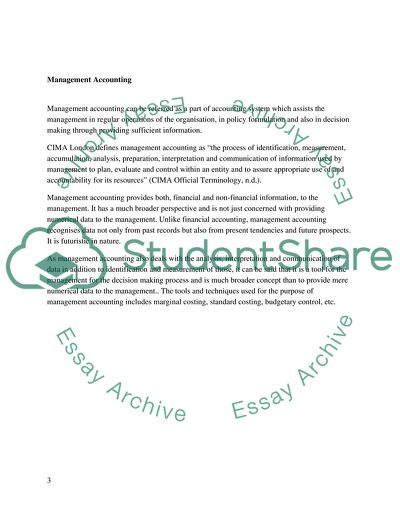
- Home
- Free Samples
- Premium Essays
- Editing Services
- Extra Tools
- Essay Writing Help
- About Us
- Studentshare
- Subjects
- Miscellaneous
- Management accounting
Management accounting - Essay Example
CIMA London defines management accounting as…

- Subject: Miscellaneous
- Type: Essay
- Level: Undergraduate
- Pages: 4 (1000 words)
- Downloads: 0
- Author: dbaumbach
Extract of sample "Management accounting"
Management accounting provides both, financial and non-financial information, to the management. It has a much broader perspective and is not just concerned with providing numerical data to the management. Unlike financial accounting, management accounting recognises data not only from past records but also from present tendencies and future prospects. It is futuristic in nature. As management accounting also deals with the analysis, interpretation and communication of data in addition to identification and measurement of those, it can be said that it is a tool for the management for the decision making process and is much broader concept than to provide mere numerical data to the management.. The tools and techniques used for the purpose of management accounting includes marginal costing, standard costing, budgetary control, etc.
Strategy is the process deployed by an organisation to accomplish its mission and long term objectives. As management accounting facilitates the top management with preparation, analysis, interpretation and communication of financial and non-financial information, the essence of management accounting is implicit with the strategic process in an organisation. Management accounting provides the top management with the required (interpreted) information at the right time which inturn aids the management in decision making process.
So, it can be said that management accounting and the strategic process goes hand in hand in an organisation. Quality, Cost and Time are the three important aspects of any strategy. Management accounting information assists the top management to achieve the quality goals. It also helps the management to achieve the objective of cost management as management accounting also involves costing methods. In addition to quality and cost, management accounting also provides timely information to the decision-makers (Bell J.
, Ansari S., Klammer T., Lawrence C., n.d.) . Therefore, it can be
...Download file to see next pages Read MoreCHECK THESE SAMPLES OF Management accounting
The Nature and Role of Management Accounting
Management Accounting - Johnson and Kaplans Relevance Lost
Continuous Improvements in the Accounting Information Systems of Businesses
Management Accounting - Benefits and Problems Associated with Financial Performance Indicators
Why ABC System Results in More Accurate Costing
Activity Based Costing
Traditional Costing and Activity-Based Costing
Management Accounting for Sports Company

- TERMS & CONDITIONS
- PRIVACY POLICY
- COOKIES POLICY